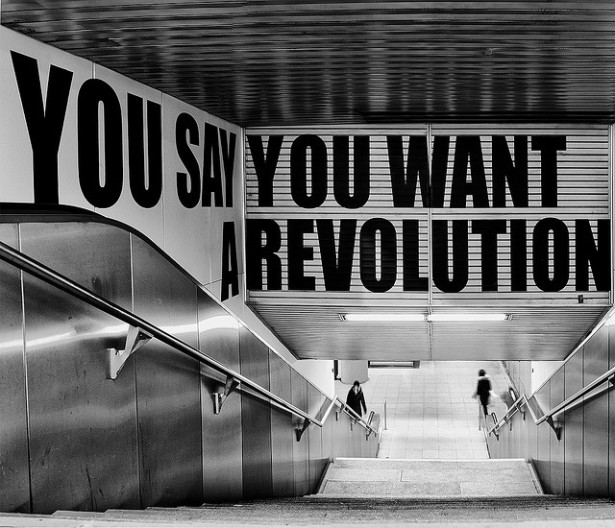Originally published at Waging Nonviolence.

What do contact with extraterrestrials, the return of Jesus Christ, apocalypse, and revolution all have in common? In a sense, they are all imagined redemptions — epic reset buttons for humanity. Onto these we can pin our heartbreaks and frustrations with the world as it is, with all its suffering, mire and messy details. Any of these redemptive apocalypses can serve as the X that solves the daunting problem of our sense of impotency. This messianic X — this unknown and imaginary seismic intervention — might help us to hold onto a kind of hope despite overwhelming evidence of a hopeless reality. Somehow, someday, something will occur that stops the madness, and we will be able to begin anew.
We need hope — in life and also in political mobilization. Hope is an essential ingredient in scaling up collective action beyond the limited pool of martyrs, saints and counter-cultural usual suspects. Organizing large-scale collective power requires something of an art of raising popular hopes and expectations. A long-term vision of a radically transformed world can be an important grounding for such hope. And isn’t such radical transformation precisely the idea of social and political revolution? Isn’t it a bit unfair to include revolution as an item on the same list as the Biblical end of days?
Perhaps it is a bit unfair. It depends on whether we mean revolution as horizon or revolution as apocalypse. Do we imagine a revolutionary restructuring of power relations in society as an all-or-nothing totalizing moment or as an aspirational horizon, something to always be moving towards? If the former, then what incentive do we have to study the details of the terrain where we are presently situated? Why would we bother to strategize about overcoming the particular obstacles that block our way today, if we believe that the accumulation of all obstacles will ultimately add up to a grand crisis that will somehow magically usher in a new era? Believing that things will “have to get worse before they get better,” we may become disinterested in — perhaps even sabotaging of — efforts to improve real-life conditions in the here and now. After all, why put a band-aid on a gaping wound? Why prolong the life of an oppressive system? With such logic we can excuse ourselves from the trouble of getting to know our political terrain. It is, after all, the very mess we hope to avoid. Continue reading
 I like to fancy myself a revolutionary… blah blah what does that even mean? I’d like to suggest for a minute that maybe the words revolution and revolutionary have been mostly emptied of their contents; that their meanings are more than slightly ambiguous, even among their proponents (I’m talking specifically within the United States); that they serve largely as references to inspirational historical moments and as signifiers of belonging (i.e. “getting it”) within some radical groups, organizations and subcultures — much more than these words presently (again, in the US) suggest an instructive path or framework for social, economic and political change.
I like to fancy myself a revolutionary… blah blah what does that even mean? I’d like to suggest for a minute that maybe the words revolution and revolutionary have been mostly emptied of their contents; that their meanings are more than slightly ambiguous, even among their proponents (I’m talking specifically within the United States); that they serve largely as references to inspirational historical moments and as signifiers of belonging (i.e. “getting it”) within some radical groups, organizations and subcultures — much more than these words presently (again, in the US) suggest an instructive path or framework for social, economic and political change.